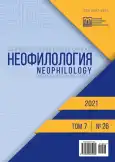Smolensk patois and the Belarusian language (incomplete lexical matches)
- Авторлар: Lunkova E.S.1
-
Мекемелер:
- Smolensk State University
- Шығарылым: Том 7, № 26 (2021)
- Беттер: 202-212
- Бөлім: РУССКИЙ ЯЗЫК
- URL: https://journal-vniispk.ru/2587-6953/article/view/302442
- DOI: https://doi.org/10.20310/2587-6953-2021-7-26-202-212
- ID: 302442
Дәйексөз келтіру
Толық мәтін
Аннотация
The work is focused on specific underived nouns that are functioning in the Smolensk patois and in the Belarusian language at the present stage of the existence of these language systems and are quite close, but not identical formations in semantic and structural terms. The subject of the study is the volume of lexical meaning and potential derivational connections of nouns recorded in two synchronous language formations. The relevance of the study is determined by the complex history of the Russian and Belarusian borderland, which is reflected both in the Smolensk patois and in the Belarusian language, which had been created on the dialect basis. The vocabulary of the Russian and Belarusian borderland belongs to a single cultural and historical continuum determined by the history of the region, it reflects the diverse material and spiritual ties of the two language idioms’ speakers. The complexity of the historical relations between the two language systems, one of which is codified and has the status of an official language (Belarusian language), and the second exists only in an oral form and has a norm due to internal language laws of development (Smolensk patois), has led to the fact that when studying two language formations at the present stage, it is possible to speak not only about unambiguous types of relations between words, but also about peripheral types, about zones of various transitions, changes in lexical and grammatical semantics, which can potentially be points of development of two idioms in the future and are therefore valuable for study.
Негізгі сөздер
Авторлар туралы
E. Lunkova
Smolensk State University
Хат алмасуға жауапты Автор.
Email: ttf32lunkova@mail.ru
ORCID iD: 0000-0003-2536-9886
Candidate of Philology, Associate Professor of Russian Language Department
4 Przhevalskogo St., 214000 Smolensk, Russian FederationӘдебиет тізімі
- Lunkova E.S. Leksicheskiye paralleli v smolenskikh i mogilevskikh govorakh (neproizvodnaya leksika) [Lexical parallels in Smolensk and Mogilev dialects (non-derivated vocabulary)]. Izvestiya Smolenskogo gosudarstvennogo universiteta [Bulletin of Smolensk State University], 2019, no. 3, issue 47, pp. 130-140. (In Russian).
- Lunkova E.S. K voprosu o vzaimodeystvii smolenskikh govorov i belorusskogo yazyka [The issue of interaction of Smolensk patois and the Belarusian language]. Neofilologiya – Neophilology, 2020, vol. 6, no. 24, pp. 669-685. (In Russian). doi: 10.20310/2587-6953-2020-6-24-669-685
- Ivanova A.I., Boyarinova L.Z. (eds.). Slovar’ smolenskikh govorov [Dictionary of Smolensk Ptois]. Issue 1-11, Smolensk, 1974–2005. (In Russian).
- Borisova E.N. (ed.). Regional’nyy istoricheskiy slovar’ vtoroy poloviny XVI – XVII vv. (po pamyatnikam pis’mennosti Smolenskogo kraya) [Regional Historical Dictionary of the Second Half of the 16th – 17th Centu-ries. (On the Monuments of Writing of the Smolensk Region)]. Smolensk, Smolensk State University Publ., 2000, 368 p. (In Russian).
- Barkhudarov S.G. (executive ed.). Slovar’ russkogo yazyka XI–XVII vv. [Dictionary of the Russian Language of the 11th-17th Centuries.]. Moscow, St. Petersburg, Nauka Publ., 1975–2015, issue 1–30. (In Russian).
- Fasmer M. Etimologicheskiy slovar’ russkogo yazyka: v 4 t. [Etymological Dictionary of the Russian Language: in 4 vols.]. Moscow, Astrel – AST Publ., 2004. (In Russian).
- Evgenyeva A.P. (ed.). Slovar’ russkogo yazyka: v 4 t. [Dictionary of the Russian Language: in 4 vols.]. Moscow, Russian Lnguage Publ., 1985–1988. (In Russian).
Қосымша файлдар









